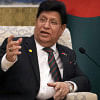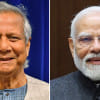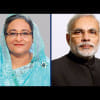Yunus-Modi meeting a positive step

A long-awaited meeting has taken place between Chief Adviser Prof Muhammad Yunus and Indian Prime Minister Narendra Modi on the sidelines of the Bay of Bengal Initiative for Multi-Sectoral Technical and Economic Cooperation (BIMSTEC) Summit in Thailand. The meeting comes as a positive sign for the Bangladesh-India relationship, which has been strained since the political changeover in August, resulting in the ouster of Sheikh Hasina. The April 3 meeting between Modi and Yunus, the first in-person engagement in the last seven months, raises hope for improved ties between the two neighbouring countries.
Yunus and Modi have known each other for a long time, and Yunus's presentation of the picture of the two leaders from 2015 to Modi must have been a reminder of the cordial relationship that exists between them. This perhaps opened the doors for the candid dialogue that followed. Both sides were forthright in sharing their concerns and acknowledged the importance of the historic, cultural, and trade links between the two countries. Professor Yunus brought up border killings, water-sharing treaties, and Dhaka's request to extradite Sheikh Hasina, among other issues. PM Modi stated that they do not support any particular political party and wish to maintain a people-to-people relationship, which is what we expect. The Indian prime minister, on the other hand, shared their concerns regarding the minority situation in Bangladesh. While Yunus reiterated his assurance that the interim government is addressing the issue, he also pointed out the fake and exaggerated presentation of the issue in Indian media. Though the meeting did not offer immediate solutions for any problems that exist between the two nations, it undoubtedly launched a dialogue, which, we hope, will result in follow-up steps. This is especially crucial for Bangladesh as a lower riparian country, as the Ganges Water Treaty is soon to expire, and the Teesta Water Treaty has seen no headway for years.
We also hope that, following this meeting, the negative discussion in the Indian media regarding Bangladesh will stop. Given the importance of a strong India-Bangladesh tie, realism must set in our bilateral relations, and insensitive rhetoric of all sorts should be avoided. Dialogues with our Indian counterparts should be fact-based and realistic, leading to decisions that mutually benefit both parties. We hope that both governments will strive to build a win-win relationship between the two neighbours.


 For all latest news, follow The Daily Star's Google News channel.
For all latest news, follow The Daily Star's Google News channel. 









Comments